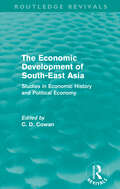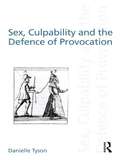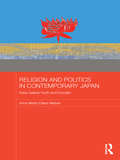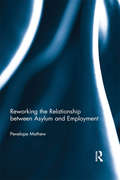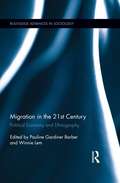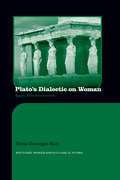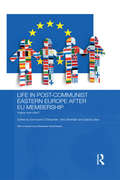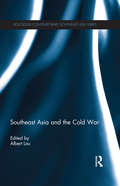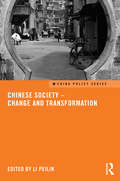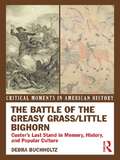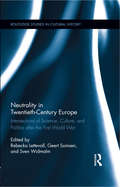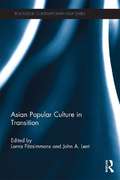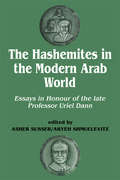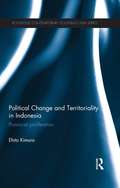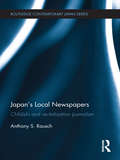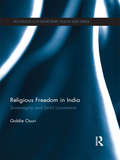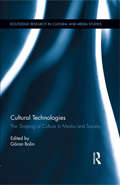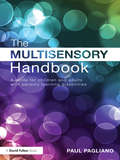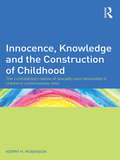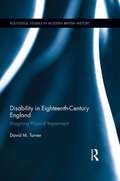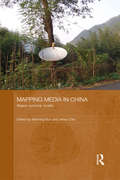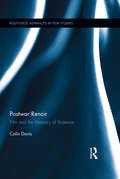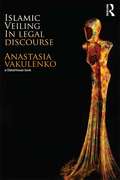- Table View
- List View
The Economic Development of South-East Asia: Studies in Economic History and Political Economy (Routledge Revivals)
by C. D. CowanFirst published in 1964, The Economic Development of South-East Asia: Studies in economic history and political economy contains eight papers originally written for a study group at the School of Oriental and African Studies in London. The papers, edited by Professor C. D. Cowan, are written against a background of economic underdevelopment in large parts of Asia. Economic problems increasingly plagued the governments of Asia after the Second World War, and while Western governments were willing to help foster economic development, relations with Asian governments were somewhat hindered by the heritage of their colonial past. Problems also related to the growth of traditional trading ports and export crops, and to the importation of colonial regimes, western funds and skills in the nineteenth century. Such developments come under the loosely generalised concept of imperialism, with its strongly emotional overtones, whose use impedes the objective assessment and analysis of facts. While we understand a good deal about conditions of economic growth in the West, much of what has fostered or retarded growth in other parts of the world remains less clear.
Sex, Culpability and the Defence of Provocation
by Danielle TysonThe partial defence of provocation is one of the most controversial doctrines within the criminal law. It has now been abolished in a number of international jurisdictions. Addressing the trajectory of debates about reform of the provocation defence across different jurisdictions, Sex, Culpability and the Defence of Provocation considers the construction and representation of subjectivity and sexual difference in legal narrations of intimate partner homicide. Undeniably, the most vexing exculpatory cultural narrative of our times is that of a woman 'asking for it'. This book explores how the process of judgment in a criminal trial involves not only the drawing of inferences from the facts of a particular case, but also operates to deliver a narrative. Law, it is argued, constructs a narrative of how the female body incites male violence. And, pursuing an approach that is informed by socio-legal studies, literary theory and feminist theories of the body, Sex, Culpability and the Defence of Provocation considers how this narrative is constructed via a range of discursive practices that position woman as a threat to masculine norms of propriety and autonomy. Once we have a clear understanding of the significance of narrative in legal decision-making, we can then formulate textual strategies of resistance to the violence of law's victim-blaming narratives by rewriting them.
Religion and Politics in Contemporary Japan: Soka Gakkai Youth and Komeito (Japan Anthropology Workshop Series)
by Anne Mette Fisker-NielsenPresenting a study of politics at grassroots level among young Japanese, this book examines the alliance between the religious movement Soka Gakkai (the ‘Value-creation Society’) and Komeito (the ‘Clean Government Party’), which shared power with the Liberal Democratic Party from 1999 to 2009. Drawing on primary research carried out among Komeito supporters, the book focuses on the lives of supporters and voters in order to better understand the processes of democracy. It goes on to discuss what the political behaviour of young Komeito supporters tell us about the role of religious organizations, such as Soka Gakkai, in Japanese politics. Unlike most other books on politics in Japan which tend to concentrate on political elites, this book provides extremely valuable insights into political culture at the grassroots level.
The Stern Gang: Ideology, Politics and Terror, 1940-1949
by Joseph HellerThis study of "The Stern Gang" attempts to demythologize the image of this extremist, Zionist underground group. The book analyzes the party's split from the Irgun Zvai Leumi (National Military Organization) and its attempts to synthesize the politics and ideals of the right and left.
Reworking the Relationship between Asylum and Employment
by Penelope MathewTouching on the laws and practices of a wide array of countries around the globe, this book examines the extent to which refugees and asylum-seekers’ right to work is protected by international human rights law. The book examines a number of key international treaties, national constitutions and some foundational cases from national courts in order to make the case that the practise of restricting refugees and asylum-seekers access to the labour market is illegal. In so doing, the author examines some intricate legal questions, such as the interpretation of the Refugee Convention’s provisions restricting rights to refugees ‘lawfully staying’, the application of racial discrimination to citizenship distinctions, and the ways in which limitations on human rights are applicable in this context. The book also looks at some broader philosophical questions such as the meaning of equality and human dignity, and the legitimacy of the right to work. The book goes on to explore broader debates concerning migration and ‘open borders’ in order to unpack the fears that drive many countries’ restrictive measures. Readers are invited to consider whether the world would be a better place with more freedom of movement. It is a unique stand-alone treatment of the subject and includes the Michigan Guidelines on the Right to Work. Reworking the Relationship between Asylum-Seekers and Employment is written in an accessible style that will appeal to academics, policy-makers, practitioners and students. It combines a strong black-letter approach with a law in context approach that explains why the law takes its current shape and questions current orthodoxy.
Migration in the 21st Century: Political Economy and Ethnography (Routledge Advances in Sociology)
by Winnie Lem Pauline Gardiner BarberThis edited collection focuses on global migration in its inter-regional, international and transnational variants, and argues that contemporary migration scholarship is significantly advanced both within anthropology and beyond it when ethnography is theoretically engaged to grapple with the social consequences and asymmetries of twenty-first century capitalism’s global modalities. Drawn from settings across the globe, case studies explore the nuanced formations of class and power within particular migration flows while addressing the complex analytics of a contemporary critical political economy of migration. Subjects include global migrants as capitalists, entrepreneurs and "cosmopolitans," as well as workers and immigrants who are subject to varying degrees of precariousness under intensified competition for profits within contemporary global economies. By re-addressing the question of the relationship between changes in global capitalism and migration, the book aims for a timely intervention into the debates on migration which have come to be one of the most contentious emotionally fraught issues in North America and Europe.
Plato's Dialectic on Woman: Equal, Therefore Inferior (Routledge Monographs in Classical Studies)
by Elena BlairWith the birth of the feminist movement classicists, philosophers, educational experts, and psychologists, all challenged by the question of whether or not Plato was a feminist, began to examine Plato’s dialogues in search of his conception of woman. The possibility arose of a new focus affecting the view of texts written more than two thousand years in the past. And yet, in spite of the recent surge of interest on woman in Plato, no comprehensive work identifying his position on the subject has yet appeared. This book considers not only the totality of Plato’s texts on woman and the feminine, but also their place within both his philosophy and the historical context in which it developed. But this book is not merely a textual study situating the subject of woman philosophically and historically; it also uncovers the implications hidden in the texts and the relationships that follow from them. It draws an image of the Platonic woman as rich and full as the textual and historical information allows, offering new and sometimes unexpected results beyond the topic of woman, illuminating aspects of Plato’s work that are of relevance to Platonic studies in general.
Life in Post-Communist Eastern Europe after EU Membership: Happy Ever After? (Routledge Contemporary Russia And Eastern Europe Ser.)
by Donnacha Ó Beacháin Vera Sheridan Sabina StanThis book examines how membership of the European Union has affected life in the ten former communist countries of Eastern Europe that are now members of the European Union. For each country, political, economic and social changes are described and discussed, together with people’s perceptions of the effects of EU membership. Overall, the book shows how the benefits of EU membership have differed between different countries, and how perceptions about the benefits also differ and have changed over time.
Southeast Asia and the Cold War (Routledge Contemporary Southeast Asia Series)
by Albert LauThe origins and the key defining moments of the Cold War in Southeast Asia have been widely debated. This book focuses on an area that has received less attention, the impact and legacy of the Cold War on the various countries in the region, as well as on the region itself. The book contributes to the historiography of the Cold War in Southeast Asia by examining not only how the conflict shaped the milieu in which national and regional change unfolded but also how the context influenced the course and tenor of the Cold War in the region. It goes on to look at the usefulness or limitations of using the Cold War as an interpretative framework for understanding change in Southeast Asia. Chapters discuss how the Cold War had a varied but notable impact on the countries in Southeast Asia, not only on the mainland countries belonging to what the British Foreign Office called the "upper arc", but also on those situated on its maritime "lower arc". The book is an important contribution to the fields of Asian Studies and International Relations.
Chinese Society - Change and Transformation: Change And Transformation (China Policy Ser. #25)
by Li PeilinThere is growing interest in social transformation in contemporary China, with much work published on the subject. This book is different from other books in that it presents an overview of the work of Chinese sociologists on how Chinese society is changing. It reports on a great deal of original research by leading, outstanding Chinese scholars, including extensive fieldwork and large-scale social change survey data, and covers comprehensively the full range of aspects of the subject. It assesses developments since the beginning of reform in China, and provides, overall, a comprehensive understanding of China’s social development and of the likely impact of future social changes on China.
The Battle of the Greasy Grass/Little Bighorn: Custer's Last Stand in Memory, History, and Popular Culture (Critical Moments in American History)
by Debra BuchholtzIn June of 1876, the U.S. government’s plan to pressure the Lakota and Cheyenne people onto reservations came to a dramatic and violent end with a battle that would become enshrined in American memory. In the eyes of many Americans at the time, the Battle of Little Bighorn represented a symbolic struggle between the civilized and the savage. Known as the Battle of the Greasy Grass to the Lakota, the Battle of Little Bighorn to the people who suppressed them, and as Custer’s Last Stand in the annals of popular culture, the event continues to captivate students of American history. In The Battle of Little Bighorn, Debra Buchholtz narrates the history of the battle and critically examines the legacy it has left. Through government documents, newspaper articles, and eyewitness accounts, Buchholtz situates the material and symbolic impact of the battle at the time. Using popular film and cultural references, she investigates the ways in which the wake of the event continues to shape the way students understand indigenous peoples, the Wild West, and the history of America.
Neutrality in Twentieth-Century Europe: Intersections of Science, Culture, and Politics after the First World War (Routledge Studies in Cultural History)
by Geert Somsen Sven Widmalm Rebecka LettevallWhether in science or in international politics, neutrality has sometimes been promoted, not only as a viable political alternative but as a lofty ideal – in politics by nations proclaiming their peacefulness, in science as an underpinning of epistemology, in journalism and other intellectual pursuits as a foundation of a professional ethos. Time and again scientists and other intellectuals have claimed their endeavors to be neutral, elevated above the world of partisan conflict and power politics. This volume studies the resonances between neutrality in science and culture and neutrality in politics. By analyzing the activities of scientists, intellectuals, and politicians (sometimes overlapping categories) of mostly neutral nations in the First World War and after, it traces how an ideology of neutralism was developed that soon was embraced by international organizations. This book explores how the notion of neutrality has been used and how a neutralist discourse developed in history. None of the contributions take claims of neutrality at face value – some even show how they were made to advance partisan interests. The concept was typically clustered with notions, such as peace, internationalism, objectivity, rationality, and civilization. But its meaning was changeable – varying with professional, ideological, or national context. As such, Neutrality in Twentieth-Century Europe presents a different perspective on the century than the story of the great belligerent powers, and one in which science, culture, and politics are inextricably mixed.
Asian Popular Culture in Transition (Routledge Contemporary Asia Series)
by Lorna Fitzsimmons John A. LentAsian Popular Culture in Transition examines contemporary consumption practices in South Korea, China, India, and Japan, and both updates and extends popular culture studies of the region. Through an interdisciplinary lens, this collection of essays explores how recent advances and shifts in information technologies and globalization have impacted cultural markets, fashion, the digital generation, mobile culture, femininity, matrimonial advertising, and a film actress’ image and performance. Drawing upon a diverse range of sources and methods including historical research, content analysis, anthropological observation, textual analyses, and interviews, Asian Popular Culture in Transition makes a significant contribution to this growing area of research. Given its broad range of countries, theories, and approaches, this book will be of great interest to students and scholars of Asian studies, cultural studies, media and communication studies, and gender studies.
The Hashemites in the Modern Arab World: Essays in Honour of the late Professor Uriel Dann
by Uriel Dann Aryeh Shmuelevitz Asher SusserExamines the crucial role of the Hashemites in Arab nationalism throughout the 20th century, from the 1916 Arab Revolt through the creation of Arab states after World War I, the attempts at Arab unity, and the establishment of two kingdoms, to the current Palestinian debate.
Political Change and Territoriality in Indonesia: Provincial Proliferation (Routledge Contemporary Southeast Asia Series)
by Ehito KimuraWhat makes large, multi-ethnic states hang together? At a time when ethnic and religious conflict has gained global prominence, the territorial organization of states is a critical area of study. Exploring how multi-ethnic and geographically dispersed states grapple with questions of territorial administration and change, this book argues that territorial change is a result of ongoing negotiations between states and societies where mutual and overlapping interests can often emerge. It focuses on the changing dynamics of central-local relations in Indonesia. Since the fall of Suharto’s New Order government, new provinces have been sprouting up throughout the Indonesian archipelago. After decades of stability, this sudden change in Indonesia’s territorial structure is puzzling. The author analyses this "provincial proliferation", which is driven by multilevel alliances across different territorial administrative levels, or territorial coalitions. He demonstrates that national level institutional changes including decentralization and democratization explain the timing of the phenomenon. Variations also occur based on historical, cultural, and political contexts at the regional level. The concept of territorial coalitions challenges the dichotomy between centre and periphery that is common in other studies of central-local relations. This book will be of interest to scholars in the fields of comparative politics, political geography, history and Asian and Southeast Asian politics.
Japan's Local Newspapers: Chihōshi and Revitalization Journalism (Routledge Contemporary Japan Series)
by Anthony S. RauschJapan is one of the world’s most literate societies. Its national newspapers are the most read newspapers in the world, and the country also has a very vibrant local newspaper sector. This book assesses the vital role local newspapers play in the development of local communities, as well as examining their development, industry structure and production conventions. The author employs the key term, ‘revitalization journalism’, to explore in detail the many techniques and conventions that local newspapers employ to engage with, and make an impact in, their specific host regions. The book concludes by comparing Japanese local newspapers to the current state of newspapers worldwide, and assessing how Japanese local newspapers are likely to develop in future.
Religious Freedom in India: Sovereignty and (Anti) Conversion (Routledge Contemporary South Asia Series)
by Goldie OsuriDrawing on the critical and theoretical concepts of sovereignty, biopolitics, and necropolitics, this book examines how a normative liberal and secular understanding of India’s religious identity is translatable by Hindu nationalists into discrimination and violence against minoritized religious communities. Extending these concepts to an analysis of historical, political and legal genealogies of conversion, the author demonstrates how a concern for sovereignty links past and present anti-conversion campaigns and laws. The book illustrates how sovereignty informs the making of secularism as well as religious difference. The focus on sovereignty sheds light on the manner in which religious difference becomes a point of reference for the religio-secular idioms of Bombay cinema, for legal judgements on communal violence, for human rights organizations, and those seeking justice for communal violence. This wide-ranging examination and discussion of the trajectories of (anti) conversion politics through historical, legal, philosophical, popular cultural, archival and ethnographic material offers a cogent argument for shifting the stakes and rethinking the relationship between sovereignty and religious freedom. The book is a timely contribution to broader theoretical and political discussions of (post) secularism and human rights, and is of interest to students and scholars of postcolonial studies, cultural studies, law, and religious studies.
Cultural Technologies: The Shaping of Culture in Media and Society (Routledge Research in Cultural and Media Studies)
by Göran BolinThe essays in this volume discuss both the culture of technology that we live in today, and culture as technology. Within the chapters of the book cultures of technology and cultural technologies are discussed, focussing on a variety of examples, from varied national contexts. The book brings together internationally recognised scholars from the social sciences and humanities, covering diverse themes such as intellectual property, server farms and search engines, cultural technologies and epistemology, virtual embassies, surveillance, peer-to-peer file-sharing, sound media and nostalgia and much more. It contains both historical and contemporary analyses of technological phenomena as well as epistemological discussions on the uses of technology.
The Multisensory Handbook: A guide for children and adults with sensory learning disabilities
by Paul PaglianoDo you support a child or adult with sensory perceptual issues or cognitive impairment? For people with challenging sensory and cognitive conditions, everyday life can become so unpredictable and chaotic that over time, lack of engagement can often lead to a state of learned helplessness. In this insightful text, Paul Pagliano shows how ‘learned helplessness’ can be transformed into learned optimism through multisensory stimulation, and explains how a programme of support can be designed and modulated to match the person’s needs, interests and abilities. Full of practical, easy to use multisensory assessment tools and intervention strategies, this book will help: foster a feeling of ease with the environment the child or adult experience pleasure and happiness kick-start their desire to explore encourage improved learning, social well-being and quality of life. The author offers an abundance of exciting multisensory stimulation ideas that can be applied to communication, play, leisure and recreation, therapy and education. Practical resources also show how to monitor and review applications to ensure they are being used in the most effective and enjoyable ways possible. Informed by an astute, up-to-date, comprehensive overview of research and theory, The Multisensory Handbook will appeal to primary professionals from a wide range of disciplines including education, health and social care.
Innocence, Knowledge and the Construction of Childhood: The contradictory nature of sexuality and censorship in children’s contemporary lives
by Kerry H. RobinsonInnocence, Knowledge and the Construction of Childhood provides a critical examination of the way we regulate children’s access to certain knowledge and explores how this regulation contributes to the construction of childhood, to children’s vulnerability and to the constitution of the ‘good’ future citizen in developed countries. Through this controversial analysis, Kerry H. Robinson critically engages with the relationships between childhood, sexuality, innocence, moral panic, censorship and notions of citizenship. This book highlights how the strict regulation of children’s knowledge, often in the name of protection or in the child’s best interest, can ironically, increase children’s prejudice around difference, increase their vulnerability to exploitation and abuse, and undermine their abilities to become competent adolescents and adults. Within her work Robinson draws upon empirical research to: provide an overview of the regulation and governance of children’s access to ‘difficult knowledge’, particularly knowledge of sexuality explore and develop Foucault’s work on the relationship between childhood and sexuality identify the impact of these discourses on adults’ understanding of childhood, and the tension that exists between their own perceptions of sexual knowledge, and the perceptions of children reconceptualise children’s education around sexuality. Innocence, Knowledge and the Construction of Childhood is essential reading for both undergraduate and postgraduate students undertaking courses in education, particularly with a focus on early childhood or primary teaching, as well as in other disciplines such as sociology, gender and sexuality studies, and cultural studies.
Disability in Eighteenth-Century England: Imagining Physical Impairment (Routledge Studies in Modern British History)
by David M. TurnerThis is the first book-length study of physical disability in eighteenth-century England. It assesses the ways in which meanings of physical difference were formed within different cultural contexts, and examines how disabled men and women used, appropriated, or rejected these representations in making sense of their own experiences. In the process, it asks a series of related questions: what constituted ‘disability’ in eighteenth-century culture and society? How was impairment perceived? How did people with disabilities see themselves and relate to others? What do their stories tell us about the social and cultural contexts of disability, and in what ways were these narratives and experiences shaped by class and gender? In order to answer these questions, the book explores the languages of disability, the relationship between religious and medical discourses of disability, and analyzes depictions of people with disabilities in popular culture, art, and the media. It also uncovers the ‘hidden histories’ of disabled men and women themselves drawing on elite letters and autobiographies, Poor Law documents and criminal court records. The book won the Disability History Association Outstanding Publication Prize in 2012 for the best book published worldwide in disability history and also inspired parts of the Radio 4 series, ‘Disability: A New History’, on which the author was historical adviser. The series gained 2.6 million listeners when it first aired in 2013.
Mapping Media in China: Region, Province, Locality (Routledge Contemporary China Series)
by Wanning Sun Jenny ChioMapping Media in China is the first book-length study that goes below the ‘national’ scale to focus on the rich diversity of media in China from local, provincial and regional angles. China’s media has played a crucial role in shaping and directing the country’s social and cultural changes, and whilst these shifts have often been discussed as a single and coherent phenomenon, this ignores the vast array of local and regional variations within the country’s borders. This book explores media as both a reflection of the diversity within China and as an active agent behind these growing differences. It examines the role of media in shaping regional, provincial and local identities through the prism of media economics and technology, media practices, audiences, as well as media discourses. The book covers a wide range of themes, including civil society, political resistance, state power and the production and consumption of place-specific memory and imagination. With contributions from around the world, including original ethnographic material from scholars based in China, Mapping Media in China is an original book which spans a broad range of disciplines. It will be invaluable to both students and scholars of Chinese and Asian studies, media and communication studies, geography, anthropology and cultural studies.
Postwar Renoir: Film and the Memory of Violence (Routledge Advances in Film Studies)
by Colin DavisThis book re-assesses director Jean Renoir’s work between his departure from France in 1940 and his death in 1979, and contributes to the debate over how the medium of film registers the impact of trauma. The 1930s ended in catastrophe for both for Renoir and for France: La Règle du jeu was a critical and commercial disaster on its release in July 1939 and in 1940 France was occupied by Germany. Even so, Renoir continued to innovate and experiment with his post-war work, yet the thirteen films he made between 1941 and 1969, constituting nearly half of his work in sound cinema, have been sorely neglected in the study of his work. With detailed readings of the these films and four novels produced by Renoir in his last four decades, Davis explores the direct and indirect ways in which film, and Renoir’s films in particular, depict the aftermath of violence.
The Falashas: A Short History of the Ethiopian Jews
by David F. KesslerThis third, revised edition comprises the whole of the original volume and is enhanced by the addition of a new preface and afterward which seek to reply to criticisms of the authors argument about the origins of the Falashas, and include some new thinking on the subject. Drawing on tradition and legend to reinforce his argument, the author again traces the source of the community to the Jewish settlements which existed in ancient Egypt (particularly at Elephantine on the Nile) and in the ancient Meroitic Kingdom, in present day Sudan known in the Bible as Cush.The story told in this book is remarkable, heroic and stimulating and makes a valuable contribution to our understanding of the history of the horn of Africa.
Islamic Veiling in Legal Discourse
by Anastasia VakulenkoIslamic Veiling in Legal Discourse looks at relevant law and surrounding discourses in order to examine the assumptions and limits of the debates around the issue of Islamic veiling that has become so topical in recent years. For some, Islamic veiling indicates a lack of autonomy, the oppression of women and the threat of Islamic radicalism to western secular values. For others, it suggests a positive autonomous choice, a new kind of gender equality and a legitimate exercise of one’s freedom of religion – a treasured right in democratic societies. This book finds that, across seemingly diverse legal and political traditions, a set of discursive frameworks – the preoccupation with autonomy and choice; the imperative of gender equality; and a particular western understanding of religion and religious subjectivity – shape the positions of both proponents and opponents of various restrictions on Islamic veiling. Rather than take a position on one or the other side of the debate, the book focuses on the frameworks themselves, highlighting their limitations
